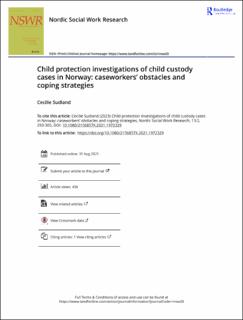Child protection investigations of child custody cases in Norway: caseworkers’ obstacles and coping strategies
Peer reviewed, Journal article
Published version
Permanent lenke
https://hdl.handle.net/11250/3097798Utgivelsesdato
2023Metadata
Vis full innførselSamlinger
- Publikasjoner fra Cristin [3269]
- SAM - Institutt for sosialfag [471]
Sammendrag
In Norway, Child Protection Services (CPS) is responsible for investigating
concerns about children at risk of being harmed by their parents’ conflicts.
This study focuses on caseworkers’ experiences of investigating cases invol-
ving long-lasting custody disputes between parents, and presents the
findings of qualitative research engaging 31 CPS caseworkers. CPS is
required to investigate cases involving parental conflicts, and the findings
show that caseworkers consider custody disputes to be harmful to children.
Many of these families have had limited experience with public services
before the marriage breakdown, and parents give contradicting stories
about their situation to caseworkers. Consequently, caseworkers are pushed
to position children as key informants, which violates the child participation
principles set out in the United Nations Convention on the Rights of the
Child. These children are, moreover, described as loyal to their parents, and
often refuse to participate. The data analysis draws on Lipsky’s concept of
‘street-level bureaucracy’ to shed light on how caseworkers manage con-
flicting goals and demands when conducting investigations. The findings
suggest that a system needs to be developed to provide caseworkers with
resources and knowledge to help them investigate and to work with these
complex family situations in a better way.

